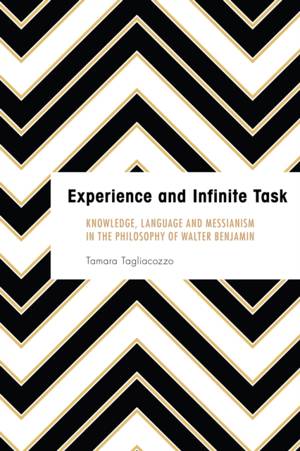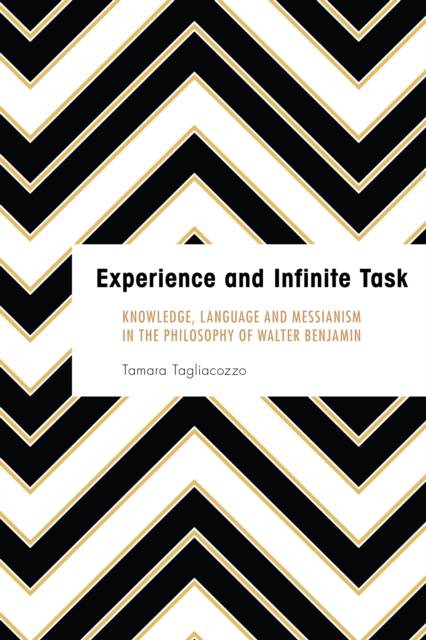
Je cadeautjes zeker op tijd in huis hebben voor de feestdagen? Kom langs in onze winkels en vind het perfecte geschenk!
- Afhalen na 1 uur in een winkel met voorraad
- Gratis thuislevering in België vanaf € 30
- Ruim aanbod met 7 miljoen producten
Je cadeautjes zeker op tijd in huis hebben voor de feestdagen? Kom langs in onze winkels en vind het perfecte geschenk!
- Afhalen na 1 uur in een winkel met voorraad
- Gratis thuislevering in België vanaf € 30
- Ruim aanbod met 7 miljoen producten
Zoeken
Experience and Infinite Task
Knowledge, Language and Messianism in the Philosophy of Walter Benjamin
Tamara Tagliacozzo
€ 77,95
+ 155 punten
Uitvoering
Omschrijving
This book examines the philosophical thought of the young Walter Benjamin and its development in his later work. Starting from his critique of the philosophy of Immanuel Kant and Hermann Cohen, the author traces the relationships among Benjamin's theories -- developed in tandem with his friend Gershom Scholem -- of knowledge, language, ethics, politics, the philosophy of history and aesthetics, all linked to the Judaic theme of messianism and language as a realm of redemption. She delineates a horizon in which the concept of experience as structure, philosophical system and "infinite task" (On the Program of the Coming Philosophy, 1917/18) evolves into a concept of the origin as monad (The Origin of German Tragic Drama, 1925), merging finally into the historical concept as monad and dialectical image (On the Concept of History, 1940). Tagliacozzo asserts that the concept of experience as structure and symbolic system, derived from his critical interpretation of Kant and Neo-Kantianism, develops into a conception of thought founded on a theological language of revelation.
Specificaties
Betrokkenen
- Auteur(s):
- Uitgeverij:
Inhoud
- Aantal bladzijden:
- 200
- Taal:
- Engels
- Reeks:
Eigenschappen
- Productcode (EAN):
- 9781786600424
- Verschijningsdatum:
- 8/03/2019
- Uitvoering:
- Paperback
- Formaat:
- Trade paperback (VS)
- Afmetingen:
- 152 mm x 229 mm
- Gewicht:
- 303 g

Alleen bij Standaard Boekhandel
+ 155 punten op je klantenkaart van Standaard Boekhandel
Beoordelingen
We publiceren alleen reviews die voldoen aan de voorwaarden voor reviews. Bekijk onze voorwaarden voor reviews.









